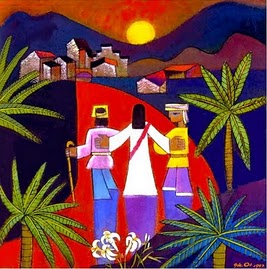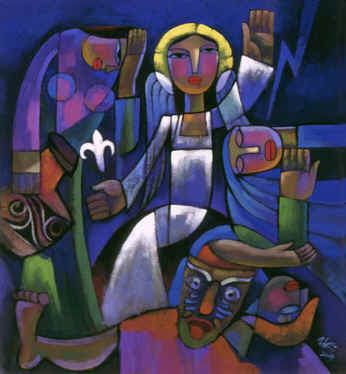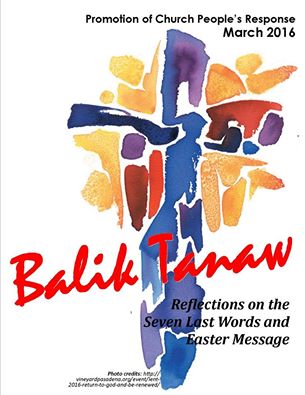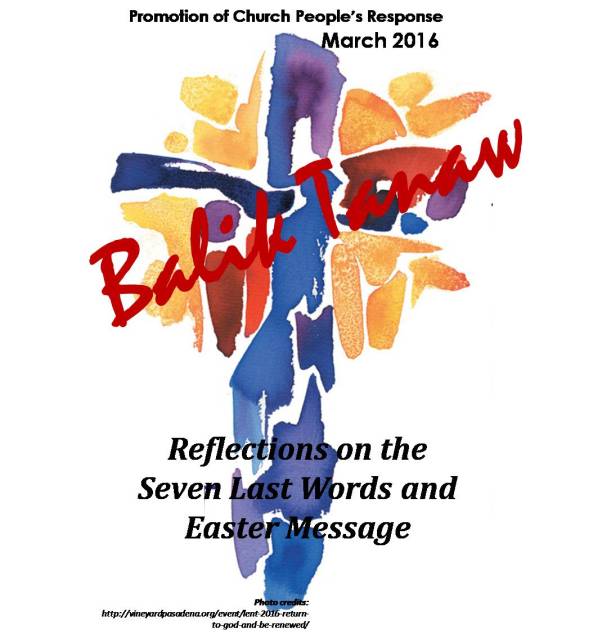By: Rev. Fr. Francisco R. Albano, Diocese of Ilagan

Enter a caption
A traditional politician once asked a gathering of students: “What should I do to convince the people to accept my leadership and my platform?” And out came one great answer: “Be crucified, die, and rise again on the third day!”
Today we proclaim and celebrate the loveliest event of all time–the resurrection of Jesus Christ from the dead. In his public ministry, Jesus tried to show people that he is God through sound teachings and miracle after miracle of healing, but people could not take the hint. Thus, a last miracle was required that would demand total surrender to Jesus as Lord and Savior; it is as if God had run out of means to win his people back to his embrace. Through his resurrection, Jesus proved that he is God and can neither deceive nor be deceived. Indeed if man and woman deliberately will not accept this, they miss the target that is God. This is what sin is–hamartia, missing the mark.
The resurrection of Jesus is definitive proof that all his claims–true, good and beautiful— are valid and of salvific value to man, woman, and all of creation, yes, to Life itself. The resurrection is clear proof of the sincerity of his words and deeds, his oneness with people for whom the resurrection is, and of his power over his own body and the laws and structures of nature. Believe the risen Christ who claimed and continues to claim again and again that “all life is good; that we are accepted; that the past is approved; that the future is open;” the gates of hell shall not prevail!
It is not easy to accept the amazing truth, goodness and beauty of the resurrection of Jesus. The reality of the resurrection is discovered, as it is, through a step-by-step process. In allowing oneself to be led by clues, by hints, by the hand of love in a spirit of openness, the evidences of human experience, both scientific and mystical/ transcendental, are revealed. To discover the risen Christ, one must journey like John who most likely began more like Mary Magdalene or Peter.
These three disciples had different attitudes toward Jesus – the son of a carpenter who went about doing good, proclaiming the good news of salvation, asserting new ethical standards, and healing the sick of body and spirit. Jesus shattered illusions of the blind, the leprous, and the sinner, demolishing the arguments of the Scribes and Pharisees; he silenced wind and wave, raised the dead to life, played with children, enjoyed wine and good humor, claimed presence before Abraham was, and walked the way of the cross. Mary Magdalene, Peter and John each loved him and were attracted to his human presence and hints of divinity. Still, each regarded Jesus differently.
The three disciples reveal three kinds of love, each differing in quality and shape according to their viewpoints or various ways of seeing the reality of an empty tomb before them. The initial reaction of Mary Magdalene reveals a love and outlook unable to see the import of sense impressions. She focuses on emptiness and the external factor of thieves: “They have taken the Lord away from the tomb, and we do not know where they have laid him,” she says. Peter’s love, on the other hand, makes him scientific: “He saw the linen clothes lying there and he saw the napkin, which had been upon Jesus’ head, not lying with the rest of the linen clothes, but lying apart from them, still in its folds, by itself.” Peter accounts what was there but did not know what to make of it. He is simply was confounded by mystery. John’s love is of highest quality; he too sees the facts, but allows these to lead him into the mystery. “So then, the other disciple, who had arrived first at the tomb, went in too, and he saw, and believed.” At that moment he realized “the meaning of scripture, that Jesus should rise from the dead.” In faith, in a mystical experience of a moment, John discovers the risen Christ whom he does not see.
After the resurrection, Mary Magdalene, Peter, and the other disciples evolved into being like John, as their love of Jesus heightened as they left behind, in proper places, the methods of simple impressions, narrow science, linear thinking, and dialectics for a EUREKA! experience of Mystery/Spirit/Love. They allowed themselves to be resurrected by Life from the graves of selfishness to love, so that they could believe and then to understand.
Thus, one can say that the resurrection event is appreciated at various levels–at the levels of the relatively unremolded experiences of Mary Magdalene or Peter and at the level of a person of great love and faith like the beloved disciple John. So it is that people love Jesus, but not Jesus Christ; or love Jesus Christ, but not him as Son of God; or love his totality as God-Man of the cross and resurrection, but would not surrender to him as Lord, Savior, and King of all creation, because of vested economic, political or cultural interests. All depends on the quality of love and grace.
Only a person of deep love and faith—one willing to go beyond the confines of body and mind and the clues of “linen clothes lying there …. the napkin, which had been upon Jesus’ head, not lying with the rest of the linen clothes, but lying apart from them, still in its folds”—can declare before the empty tomb: Eureka! Christ is risen! Ah ha!
And so, what is to be done? One takes and reads the Gospels and falls in love with Jesus-Christ-Son of God, step by step; then faces the empty tomb, experiences him unseen, and declares: “My Lord and my God!”
The resurrection of Jesus was meant for the people of God. Do you believe in the risen Christ? If so, you are commanded by the situation to accept his leadership and his platform for establishing his Kingdom and demolishing values of selfishness and the tombs of globalized Empire. Even under the high-risk conditions of passion and death!
Ah ha! Happy Easter!
Photo grab from: http://www.patheos.com/blogs/deaconsbench/2011/05/homily-for-may-8-2011-3rd-sunday-of-easter/








